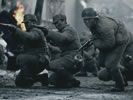Eye For Film >> Movies >> Assembly (2007) Film Review
Feng Xiaogang is well known in China for his humorous ‘holiday movies’ - high-grossing comedies to entertain the masses over the New Year. His first war film looks at a luckless company of the People’s Liberation Army trying their level best to survive battles against the Kuomintang during the Civil War.
Captain Gu Zidi is a survivor against his will. His company are decimated in an ambush by the Kuomintang, and when they regroup, they are posted to an un-winnable front, ill-equipped and vastly outnumbered against the KMT. Captain Gu picks up a new Political Officer – a bookish teacher who can’t hold a gun and spends every available moment composing letters to his wife – in order that he might have a ‘noble death’ in battle, rather than perishing ignominiously in some other way, which seems likely. The diminished company is sent to head up the front, and though they hold off the enemy a number of times, it is clear they cannot win, and they wait in desperation for the bugle call to retreat. The call never comes and they fight on.

A few years later, Captain Gu sits in a military hospital, the only survivor. He can’t remember exactly how the final moments of battle played out, or how he survived. When he was found by the People’s Liberation Army, he was wearing the enemy uniform, and the records of his Company are unavailable, so no one can verify his story. Rather than be turned out of the hospital to fend for himself, he persuades the officers to let him join another company, so that he can keep fighting. Against all odds, Gu continues to survive, in spite of continually putting himself at risk to save others, reasoning that he has the least to live for. He becomes increasingly determined to prove the truth of his story, and find his ‘brothers’, the men of his company, who are all buried in a mine where they last fought.
Director Feng balances the visceral, realistic treatment of the battles, which are harrowing as you’d expect, with Gu’s boyish, stubborn humour in the face of despair. The peppering of the script with comedy is a welcome relief from the scenes of violence, and helps Feng avoid a lapse into melodrama.
This is a film full of poignant moments that illustrate the absurdity of war, as well as the inadequacy of everything that comes after, in either acknowledging or justifying its events. What is especially heartening in this film is its abandonment of war-film clichés, and the lack of bias towards a single character or viewpoint, in spite of the obvious focus on Captain Gu.
(Though it must be said that the Kuomintang are effectively a faceless adversary, and not examined at all by Feng).
The prevailing message is that there are no heroes in war; there are only luck and circumstance, and even with those on your side, survival is a very bitter victory.
Reviewed on: 07 Mar 2008


















